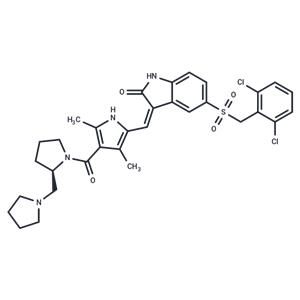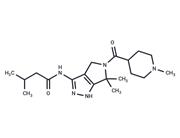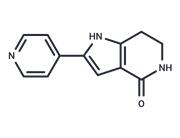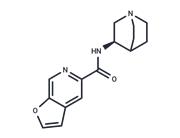| Name | PHA-665752 |
| Description | PHA-665752 is an effective, specific and ATP-competitive c-Met inhibitor (IC50: 9 nM), >50-fold selectivity for c-Met than STKs or RTKs. |
| Cell Research | For proliferation assays, cells are grown in medium with 0.1% FBS for 48 hours after which they are treated with various concentrations of PHA-665752 in HGF (50 ng/mL) in a medium containing 2% FBS. After 18 hours, cells are incubated with BrdUrd for 1 hour, fixed, and stained with anti-BrdUrd peroxidase-conjugated antibody, and plates are read at 630 nm. For apoptosis assays, cells are grown in medium with 2% FBS in presence and absence of HGF (50 ng/mL) and various concentrations of PHA-665752 for 72 hours. After 72 hours, a mixture containing ethidium bromide and acridine orange is added, and apoptotic cells (bright orange cells or cell fragments) are counted by fluorescence microscopy.(Only for Reference) |
| Kinase Assay | In vitro enzyme assay: The c-Met kinase domain GST-fusion protein is used for the c-Met assay. The IC50 value of PHA-665752 for the inhibition of c-Met is based on phosphorylation of kinase peptide substrates or poly-glu-tyr in the presence of ATP and divalent cation (MgCl2 or MnCl2 10-20 mM). The linear range (i.e., the time period over which the rate remains equivalent to the initial rate) is determined for c-Met, and the kinetic measurement and IC50 determination are performed within this range. |
| In vitro | PHA-665752 significantly inhibits c-Met kinase activity with Ki of 4 nM, and exhibits >50-fold selectivity for c-Met compared with various tyrosine and serine-threonine kinases. PHA-665752 potently inhibits the HGF-stimulated c-Met autophosphorylation with IC50 of 25-50 nM. PHA-665752 also significantly blocks HGF- and c-Met-dependent functions such as cell motility and cell proliferation with IC50 of 40-50 nM and 18-42 nM, respectively. In addition, PHA-665752 potently inhibits HGF-stimulated or constitutive phosphorylation of mediators of downstream of c-Met such as Gab-1, ERK, Akt, STAT3, PLC-γ, and FAK in multiple tumor cell lines. [1] PHA-665752 inhibits cell growth in TPR-MET-transformed BaF3 cells with IC50 of <60 nM, and inhibits constitutive cell motility and migration by 92.5% at 0.2 μM. Inhibition of c-Met by PHA665752 (0.2 μM) also induces cell apoptosis of 33.1% and G1 cell cycle arrest with cells in G1 phase increasing from 42.4% to 77.0%. PHA665752 can cooperate with rapamycin to inhibit cell growth of TPR-MET-transformed BaF3 cells and non-small cell lung cancer H441 cells. [2] |
| In vivo | Administration of PHA-665752 induces a dose-dependent tumor growth inhibition of S114 xenografts by 20 %, 39% and 68%, at dose of 7.5, 15, and 30 mg/kg/day, respectively. [1] PHA665752 treatment significantly reduces the tumor growth of NCI-H69, NCI-H441 and A549 in mouse xenografts by 99%, 75%, and 59%, respectively. PHA665752 also significantly inhibits angiogenesis by >85%, due to decreasing the production of vascular endothelial growth factor and increasing the production of the angiogenesis inhibitor thrombospondin-1. [3] |
| Storage | Powder: -20°C for 3 years | In solvent: -80°C for 1 year | Shipping with blue ice. |
| Solubility Information | DMSO : 60 mg/mL (93.51 mM)
|
| Keywords | Apoptosis | Inhibitor | inhibit | PHA-665752 | c-Met/HGFR | Autophagy |
| Inhibitors Related | Stavudine | Sodium 4-phenylbutyrate | L-Ascorbic acid | Hydroxychloroquine | Guanidine hydrochloride | Taurine | Tributyrin | Ferulic Acid | Curcumin | Paeonol | Naringin | Gefitinib |
| Related Compound Libraries | Bioactive Compound Library | Membrane Protein-targeted Compound Library | Kinase Inhibitor Library | Tyrosine Kinase Inhibitor Library | Anti-Cancer Metabolism Compound Library | Anti-Ovarian Cancer Compound Library | Inhibitor Library | Bioactive Compounds Library Max | Anti-Cancer Compound Library | Anti-Cancer Active Compound Library |

 United States
United States



